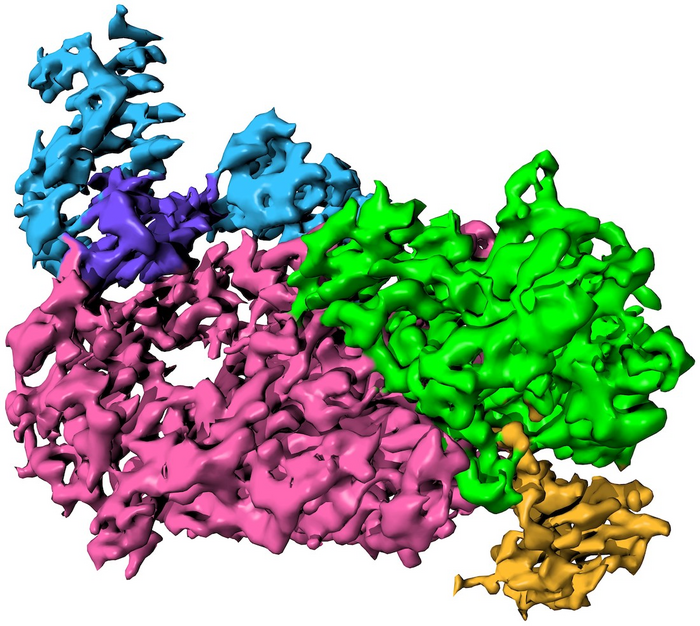A team led by UT Southwestern researchers has identified how SARS-CoV-2, the virus that causes COVID-19, builds a structure called the RNA cap that’s critical for successful viral replication. The finding, published in Nature, could lead to new strategies to attack COVID-19, which has sickened nearly 600 million and killed more than 6 million worldwide thus far.

Credit: UT Southwestern Medical Center
A team led by UT Southwestern researchers has identified how SARS-CoV-2, the virus that causes COVID-19, builds a structure called the RNA cap that’s critical for successful viral replication. The finding, published in Nature, could lead to new strategies to attack COVID-19, which has sickened nearly 600 million and killed more than 6 million worldwide thus far.
“We’re very excited to exploit and make drugs against this protein domain to inhibit RNA cap formation, which, if successful, could offer a whole new approach to treat COVID-19,” said study leader Vincent Tagliabracci, Ph.D., Associate Professor of Molecular Biology, the Michael L. Rosenberg Scholar in Medical Research at UTSW, and a Howard Hughes Medical Institute Investigator.
SARS-CoV-2 uses the genetic molecule ribonucleic acid, or RNA, to provide instructions to infected host cells to build more copies of the virus. A molecular cap on one end of the viral RNA serves multiple functions to accomplish this goal, Dr. Tagliabracci explained. It hides the RNA from the host cell’s immune system, protects it from attack by exonucleases, or cellular enzymes that degrade it, and recruits cellular factors that use the RNA to make viral proteins. If the virus is missing this RNA cap, he said, these processes cease and infection can’t continue.
The new study suggests that the SARS-CoV-2 NiRAN domain, a portion of a viral protein called nsp12, is involved in synthesizing the RNA cap. The NiRAN domain is a pseudokinase, a class of enzymes that are the major focus of the Tagliabracci lab. Experiments showed that the NiRAN domain transfers the viral RNA to another SARS-CoV-2 protein called nsp9 to create a RNA-protein intermediate that is crucial for cap formation.
Dr. Tagliabracci said that he and his colleagues are investigating ways to stymie SARS-CoV-2’s NiRAN domain function, which could eventually lead to a new class of drugs to fight COVID-19.
“In the long-term fight against COVID, we will need antivirals targeting different parts and aspects of the viral life cycle,” he said. “Adding a capping inhibitor would be a nice addition to that arsenal.”
Other researchers who contributed to this study include Gina J. Park, an M.D./Ph.D. candidate in the Medical Scientist Training Program; Adam Osinski, a student in the Graduate School of Biomedical Sciences; Genaro Hernandez, Jennifer L. Eitson, Abir Majumdar, Krzysztof Pawlowski, Zhe Chen, Yang Li, and John W. Schoggins of UTSW; and Marco Tonelli and Katie Henzler-Wildman of the University of Wisconsin-Madison.
This study was funded by the W. M. Keck Foundation, the National Institutes of Health (R01GM135189 and 1DP1AI158124), The Welch Foundation (I-1911), the Life Sciences Research Foundation, and the Polish National Agency for Scientific Exchange (PPN/BEK/2018/1/00431).
About UT Southwestern Medical Center
UT Southwestern, one of the nation’s premier academic medical centers, integrates pioneering biomedical research with exceptional clinical care and education. The institution’s faculty has received six Nobel Prizes, and includes 26 members of the National Academy of Sciences, 17 members of the National Academy of Medicine, and 14 Howard Hughes Medical Institute Investigators. The full-time faculty of more than 2,900 is responsible for groundbreaking medical advances and is committed to translating science-driven research quickly to new clinical treatments. UT Southwestern physicians provide care in more than 80 specialties to more than 100,000 hospitalized patients, more than 360,000 emergency room cases, and oversee nearly 4 million outpatient visits a year.
Journal
Nature




